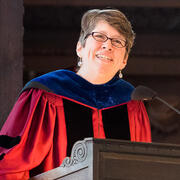
On September 25, 2018, Stephanie Paulsell, Susan Shallcross Swartz Professor of the Practice of Christian Studies, presided over the Tuesday morning Ecumenical Eucharist in Andover Chapel.
In her remarks, Paulsell discusses hearing something new in a gospel passage following recent sexual assault allegations against Supreme Court nominee Brett Kavanaugh.
Paulsell's full remarks can be read below:
Then his mother and his brothers came to him, but they could not reach him because of the crowd. And he was told, “Your mother and your brothers are standing outside, wanting to see you.” But he said to them, “My mother and my brothers are those who hear the word of God and do it.” (Luke 8: 19-21)
At the beginning of Virginia Woolf’s last novel, Between the Acts, a character named Isa reads a story in the newspaper about a sexual assault that haunts the rest of her day. Some soldiers had lured a young woman into their barracks, offering to show her a horse with a green tail, and then turned on her. “That was real,” Isa thought—so real that she seemed to see the barrack room, and the young woman struggling, before her eyes.
I’ve felt very much like Isa since Dr. Christine Blasey Ford’s account of being sexually assaulted by the president’s nominee for the Supreme Court was made public. Like Isa, I can’t get this story out of my head. “That was real,” I thought when I heard it. You could almost feel Dr. Blasey’s account moving through the atmosphere, snagging on our minds, triggering and troubling our own memories. It’s so sinkingly familiar, a story too many women know in their bones.
Women are not the only ones on the receiving end of that kind of violence, but we do seem to be expected to understand such experiences as part of being female and to arrange our lives accordingly. Even in the #metoo era, sexual harassment and abuse remain part of growing up, part of being in school, part of going to church, part of dating, part of going to parties, part of working, part of walking alone, part of jogging alone, part of life.
Even now, politicians working to save the nomination are saying that the behavior Judge Kavanaugh is accused of is just the kind of stupid thing boys do to girls at that age and shouldn’t have a bearing on this appointment. Others have suggested that Dr. Blasey might not remember clearly who hurt her all those years ago. Still others have said that if teenage sexual assault is the new standard, no man will ever be appointed to the Supreme Court again. Meanwhile, Dr. Blasey has received so many death threats that she has had to go into hiding.
Nothing shatters community quite like sexual violence. That’s why it’s so often a weapon of war. It is one of the most isolating of human experiences, shoving us suddenly from one world into another. It can be hard to come back. And when we do, we’re carrying a burden that no one else can see.
Our gospel story this morning, I think, asks to pay attention to the isolation sexual violence inflicts. I’ll admit that, as a mother, I’ve sometimes found this story a little harsh. Your mother, buster, I’m tempted to say to Jesus, is the woman who raised you and who is going to stay by the cross watching you die when all your followers have scattered.
But this week, I’m hearing the story differently. I’m hearing it as a story about Jesus’s desire to draw us into new forms of community that do not stop at the boundaries of our family or our friends. I’m hearing in it a call to new forms of family, new forms of solidarity. “My mother and my brothers,” Jesus says, “are those who hear the word of God and do it.”
Whatever happens in Washington this week, we are urgently being called to stand with each other as family: to listen to each other with compassion, to rage against the harm done, to risk ourselves in solidarity, to help bear each other’s hidden burdens. Perhaps we will discover that this is what it means to hear the word of God and do it.
This story follows immediately after Jesus’s teaching that “nothing is hidden that will not be disclosed, nor is anything secret that will not become known and come to light.” As a new light sweeps across our society, illuminating places where violence has been allowed to flourish unchecked, we’re called to the work of repair. Not rebuilding communities in the same old way but making out of the shattered pieces something new; a new family in which we hold each other accountable and put the cherishing and protection of each other’s humanity ahead of everything else.